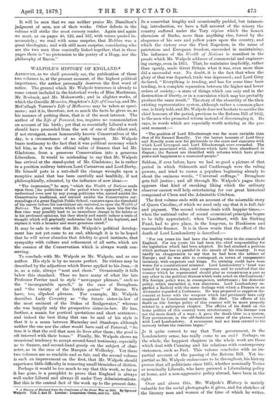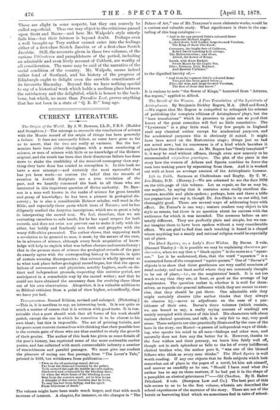WA_LPOLE'S HISTORY OF ENGLAND *
ALTHOUGH, as we shall presently see, the publication of these two volumes is, at the present moment, of the highest political
importance, the author personally deserves the first word of notice. The ground which Mr. Walpole traverses is already to some extent included in the historical works of Miss Martineau, Mr. Roebuck, and Mr. Molesworth ; and in slighter works, of which the Greville Memoirs, Stapleton's Life of Canning, and Mr. McCullagh Torrens's Life of Melbourne may be taken as speci- mens; and it is, therefore, not so much the facts he gives us, as his manner of putting them, that is of the most interest. The
author of the Life of Perceval, too, requires no commendation on account of his birth ; yet that so essentially Liberal a work should have proceeded from the son of one of the eldest and, if not strongest, most honourably known Conservatives of the
-day, is a circumstance of no slight import. Mr. Walpole bears testimony to the fact that it was political economy which led him, as it was the ethical value of finance that led Mr. Gladstone, from a generous Conservatism into a generous Liberalism. It would be misleading to say that Mr. Walpole Us arrived at the stand-point of Mr. Gladstone; he is rather in a position midway between Lord Carnarvon and Lord Derby. He himself puts in a nut-shell the change wrought upon a receptive mind that has been carefully and healthily, if not philosophically, educated, by the influence of new ideas :—
" The impression," be says, "which the Wealth of Nations made upon them [the politicians of the period when it appeared], may be -understood even now by any young politician who, mused amidst the Conservative traditions, and trained amidst the Conservative sur- roundings of a great English Public School, ventures upon the threshold of his career before his convictions are matured, to open the Wealth of Nations. The great truths which will then dawn upon him for the first time may possibly lead to no immediate change in his habits or in his professed opinions, but they slowly and surely induce a train of 'thought which will gradually undermine the faith of his boyhood, and replace it with a broader and more generous creed."
It may be safe to write that Mr. Walpole's political develop- ment has not yet come to an end, although it is to be hoped that he will never abandon that fidelity to good instincts, that
sympathy with culture and refinement of all sorts, which are -the essence of the Conservatism which is always worth con- serving.
To conclude with Mr. Walpole as Mr. Walpole, and as our author. His style is by- no means perfect. Its virtues may be described by the adjectives which Burns applied to his Jean,—it is, as a rule, always "neat and clean." Occasionally it falls -below this standard. Thus we have many of what the late Professor Ferrier used to style "newspaper phrases," such as the "incomparable speech," in the case of Brougham, and "the variety of the fertile genius" of Burns. We have, too, slipshod phrases. For example, Mr. Walpole describes Lady Coventry as "the future sister-in-law of hhe most eminent of the Dukes of Bridgewater," whereas she was happily only the prospective sister-in-law. He has, further, a mania for poetical quotations and short sentences ; and indeed the best thing that can be said of his style is that it is a mean between Macaulay and Stanhope, although neither the one nor the other would have said of Perceval, "So
true it is that the evil that men do lives after them ; the good is -oft interred with their bones." Finally, Mr. Walpole shows an
-occasional tendency to accept second-hand testimony, especially as to finance, and second-hand gossip on the subject of char- acter, as in the case of the Marquis of Wellesley. Yet these two volumes are so readable and so fair, and the second volume is such an improvement on the first, that Mr. Walpole should experience little difficulty in removing small blemishes of diction. Perhaps it would be too much to say that this work, so far as it has gone, is a pamphlet to prove that England is always well under Liberal and always ill under Tory Administrations. But this is the central fact of the work up to the present date.
* A History of England from the Conclusion of the Great War in 1815. By Spencer Walpole. Vole. Lend IL London : Longmans, Green, and Go. 1878. In a somewhat lengthy and occasionally padded, but interest- ing, introduction, we have a full account of the misery the country suffered under the Tory regime which the honest alarmism of Burke, more than anything else, forced by the eloquence of his sere and yellow years upon the country, and which the victory over the First Napoleon, in the name of patriotism and European freedom, succeeded in maintaining. The influence of the Wealth of Nations is manifest in the proofs which Mr. Walpole adduces of commercial and engineer- ing energy, even in 1815. That, he maintains implicitly, rather
than openly, made Great Britain what it was, even more than did a successful war. No doubt, it is the fact that when the glory of that war departed, trade was depressed ; and Lord Grey declared, "Everything is tending, and has for some time been tending, to a complete separation between the higher and lower orders of society,—a state of things which can only end in the destruction of liberty, or in a convulsion which may too probably produce the same result." The story of the absurdity of the then existing representative system, although rather a common-place one, is fairly told, and Mr. Walpole does not hesitate to ascribe the chief honours of the period, previous to the Reform Bill of 1832, to the men who promoted reform instead of discouraging it. He says, in words which are especially worth noticing at the pre- sent moment :—
" The position of Lord Ellenborough was far more enviable than that of Sir Samuel Romilly. Yet the barren honours of Lord Grey and Romilly seem now far preferable to the stars and sinecures with which Lord Liverpool and Lord Ellenborough were rewarded. The latter are associated with traditions which have been abandoned in disgust ; the former are identified with reforms which have given peace and happiness to a contented people."
Seldom, if ever before, have we had so good a picture of that period in which Sidmouth and Castlereagh were the ruling powers, and tried to coerce a populace beginning already to shout the ominous words, "Universal suffrage." Brougham gets full justice ; and all through Mr. Walpole's pages there appears that kind of sneaking liking which the ordinary observer cannot well help entertaining for our great historical compound of Cleon and the Admirable Crichton.
The first volume ends with an account of the miserable story of Queen Caroline, of which we need only say that it is full, fair and piquant. The second volume deals with happier times,— when the national value of sound economical principles began to be fully appreciated ; when Vansittart, with his Sinking Fund, had to give place, in the long-run, to Huskisson and reasonable finance. It is in these words that the effect of the death of Lord Londonderry is described :—
" For ten years his had been the leading voice in the counsels of England. For ten years his had been the chief responsibility for the legislation which had been adopted. He had attained a position which perhaps has no parallel in the annals of his country. It was hardly an exaggeration to say that he had been the arbiter of Europe; and he was able to correspond, on terms of comparative intimacy, with emperors and kings. No training could have been worse for a constitutional minister. Lord Londonderry's 'head was turned by emperors, kings, and congresses, and he resolved that the country which he represented should play as conspicuous a part as any other in the political dramas which were acted on the Continent.' His foreign policy was, in consequence, unfortunate; his domestic policy, which resembled it, was disastrous. Lord Londonderry re- garded a Radical with the same feelings with which a Francis or an Alexander regarded a Carbonaro. He was prepared to suppress dis- content at home with the weapons which had previously been only employed by Continental monarchs. He died. The effects of his death on the foreign policy of this country will be more properly related in a subsequent chapter. The effects of his death on the home politics of this country were revolutionary. His decease was not the mere death of a man : it gave the death-blow to a system. Tory government, in the old-fashioned sense of the phrase, ceased with Lord Londonderry. A monument had not been erected to his memory before the reaction began."
Js it quite correct to say that Tory government, in the Londonderry sense, has really come to an end ? Perhaps, on the whole, the happiest chapters in the whole work are those which deal with Canning and his relations with contemporary statesmen, such as Peel. This volume concludes with an im- partial account of the passing of the Reform Bill. Yet im- partial as Mr. Walpole endeavours to be throughout, his history proves that all politicians since 1815, whether nominally Tories or nominally Liberals, who have pursued a Liberalising policy at home, and a non-aggressive policy abroad, have been in the
right. Over and above this, Mr. Walpole's History is mainly valuable for the social photographs it gives, and for sketches of the literary men and. women of the time of which he writes.
These are slight in some respects, but they can scarcely be called superficial. Thus one may object to the criticisms passed upon Scott and Burns—and here Mr. Walpole's style utterly fails him—but their fairness is beyond doubt. Perhaps even a well brought-up Tory author cannot enter into the feelings either of a first-class Scotch Jacobin or of a first-class Scotch Jacobite. Still, the accounts given in these two volumes, of the various litterateurs and pamphleteers of the period, including an admirable and even lively account of Cobbett, are worthy of all consideration. The same may be said of the narrative of the social condition of the country. Mr. Walpole, seems indeed rather fond of Scotland, and his history of the progress of Edinburgh ought to delight even the erewhile constituents of its favourite Macaulay. Beyond this we have nothing special to say of a historical work which holds a medium place between the satisfactory and the delightful, which is honest to the back- bone, but which, no more than Paradise Lost, proves anything that has not been in a state of "Q. E. D." long ago.



































 Previous page
Previous page